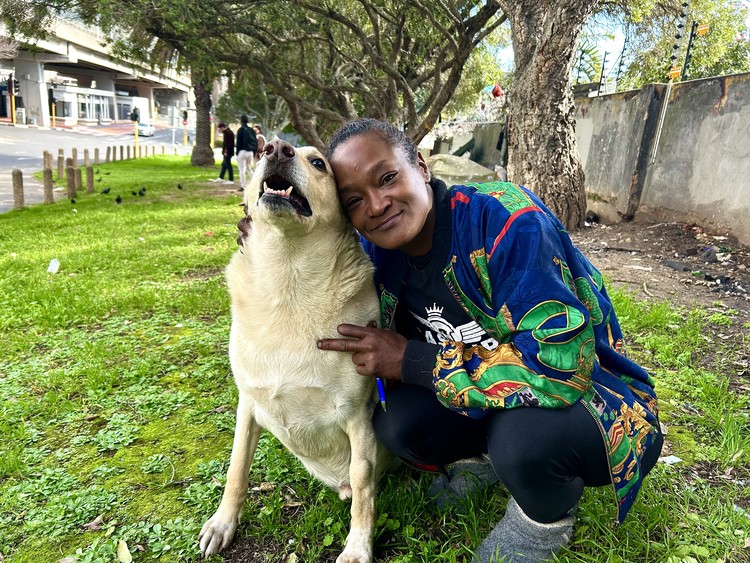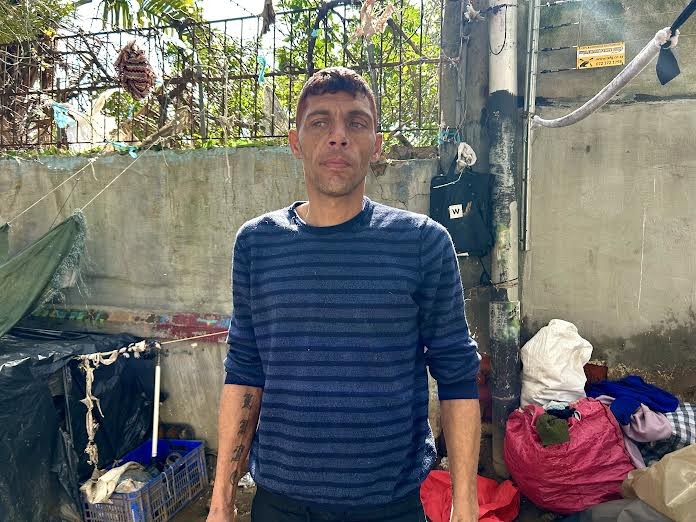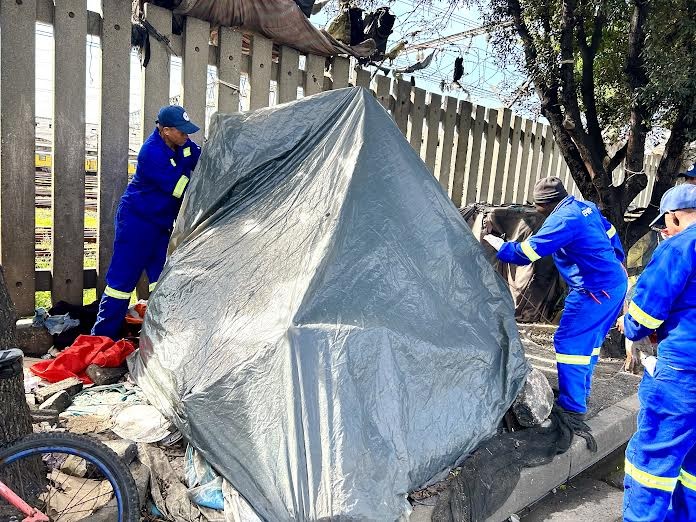City of Cape Town starts moving people from city centre streets following court judgment
Those who have not already chosen to leave will be evicted next week
Zoey Maritz said she was worried about moving to the Safe Space as it would mean she would have to give up her dog Lincoln. The Safe Spaces don’t accommodate pets. Photos: Matthew Hirsch
- The City of Cape Town started moving homeless people living on the streets of the city centre to Safe Spaces on Tuesday.
- This was in line with a June court judgment.
- Lawyers for the homeless people said the process was going smoothly.
- Some agreed to move but others preferred to stay where they were.
- But anyone left on the sites will be evicted next week, the City said.
The City of Cape Town started moving people living on the streets in the city centre to its Safe Spaces on Tuesday, in line with a June court judgment. Several people opted to go to the City’s Safe Spaces but others preferred to stay on the streets for now.
In June the Western Cape High Court granted the City an order to move hundreds of people living on the streets in and around the city centre. This followed a lengthy court battle between the City and the homeless groups occupying spaces along Buitengracht Street, FW De Klerk Boulevard, Foregate Square, Helen Suzman Boulevard, Strand Street, Foreshore/N1, Virginia Avenue and Mill Street Bridge. They were represented by the Socio-Economic Rights Institute of South Africa (SERI).
Last week the City said it would “provide assistance for the voluntary relocations to Safe Spaces” this week, after which preparations would be made to evict anyone left at the sites after 12 August.
When GroundUp arrived at the Mill Street site, one person had decided to move but the others were staying for now.
Fabian Johnson, who has been living near the Mill Street site for four months but on the streets for 15 years, said he was reluctant to move. He was worried about the long term prospects of staying in the Safe Spaces.
He said he is a qualified electrician but it is difficult to find work. “People don’t employ people that live on the streets. They don’t trust people living on the streets,” he said.
Fabian Johnson, who has been living on the streets for 15 years, said he was reluctant to move to the Safe Spaces. He has been at the Mill Street site for four months.
Zoey Maritz was worried that she would have to leave her dog, Lincoln, behind if she moved. “He’s the most clever dog in the world. Everybody knows him,” she said. She said she had ended up on the street after running away from home at 16.
Nkosinathi Sithole, senior attorney at SERI, said though rules at the Safe Spaces had been “adjusted adequately” there was unfortunately no plan to accommodate pets.
When GroundUp arrived at Strand Street, we saw a large contingent of law enforcement vehicles. People in Expanded Public Works Programme uniforms were taking down structures and putting materials into the back of a trailer.
Moerieda Petersen, who has been living on the streets for about two years, was holding on to her belongings. She was one of those who decided to move to the Safe Space site. She said she hoped eventually to be reunited with her children.
Sithole said that the first day of relocations had been relatively smooth. He called for the evictions set for 12 August to be done humanely. “We call for calm and understanding from the law enforcement and the sheriff,” he said.
“Accepting social assistance to get off the streets is the best choice for dignity, health, and well-being, and the City has gone to great lengths to extend every offer of care to individuals unlawfully occupying public places in various parts of the CBD,” said Mayor Geordin Hill-Lewis in a statement. “No person has the right to indefinitely refuse all offers of social support while reserving a public place as exclusively theirs.”
The relocation process is set to continue this week, starting with the Helen Suzman Boulevard site on Wednesday.
Expanded Public Works Programme workers removed some of the makeshift shelters in Strand Street. The shelters belonged to people who had agreed to move voluntarily.
Support independent journalism
Donate using Payfast

Don't miss out on the latest news
We respect your privacy, and promise we won't spam you.
Next: Kidnapped shop owner found murdered
Previous: Hundreds of waste pickers march in Joburg demanding compensation
© 2024 GroundUp. This article is licensed under a Creative Commons Attribution-NoDerivatives 4.0 International License.
You may republish this article, so long as you credit the authors and GroundUp, and do not change the text. Please include a link back to the original article.
We put an invisible pixel in the article so that we can count traffic to republishers. All analytics tools are solely on our servers. We do not give our logs to any third party. Logs are deleted after two weeks. We do not use any IP address identifying information except to count regional traffic. We are solely interested in counting hits, not tracking users. If you republish, please do not delete the invisible pixel.



